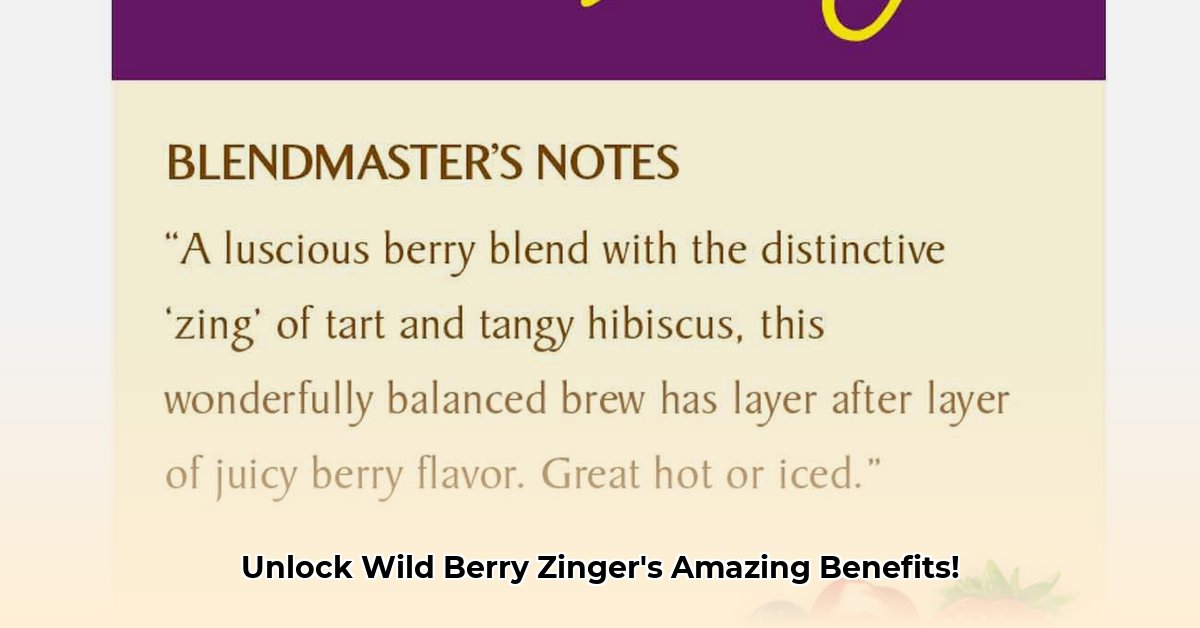
Benefits of Wild Berry Zinger Tea: A Critical Review
Wild berry zinger tea, a blend often featuring hibiscus (the "zinger"), has garnered attention for its purported health benefits. This review examines the available evidence, separating substantiated claims from those requiring further investigation. We will explore potential effects on weight management, immunity, and other areas, while emphasizing the need for a balanced perspective and responsible consumption.
Antioxidant Properties and Immune Support
Both wild berries and hibiscus are rich in antioxidants (natural compounds that combat cell damage from free radicals). This antioxidant capacity may contribute to immune system support; however, the precise extent of this benefit requires more research. While antioxidants are beneficial, moderation is key; excessive intake doesn't automatically translate to superior outcomes. The specific antioxidant profile varies considerably depending on the berry blend, highlighting the importance of understanding the tea's composition.
Weight Management: A Supporting Role, Not a Guaranteed Solution
Numerous anecdotal accounts associate wild berry zinger tea with weight loss. However, robust scientific evidence supporting a direct causal link remains limited. While some studies suggest potential indirect contributions through mechanisms like improved metabolism or blood pressure regulation (with hibiscus specifically), further, larger-scale clinical trials are needed to confirm these effects. A balanced diet and regular exercise remain the cornerstones of effective weight management; tea should be viewed as a supplementary tool, not a standalone solution. Can a beverage truly influence body weight? The answer is nuanced and requires a careful look at the available data.
Cardiovascular Health: Hibiscus's Potential Contribution
Hibiscus, a key component of many zinger teas, shows more promise regarding cardiovascular health. Some studies suggest it might contribute to lower blood pressure. However, this should not replace prescribed medical treatment. Individuals with existing cardiovascular conditions or those taking related medications should consult their physician before incorporating hibiscus tea into their routine. Always prioritize professional medical advice over self-medication. Is there a link between hibiscus and heart health? Some research suggests a correlation, but more studies are crucial.
Reproductive Health: Preliminary Findings, Further Research Needed
Early research suggests potential benefits of wild berry components for reproductive health, including fertility and ovarian health. However, this area remains largely unexplored. We lack the extensive research needed to draw definitive conclusions. The diverse composition of wild berry blends further complicates establishing specific correlations with reproductive health outcomes. Are there links between certain berries and reproductive health? Limited early studies suggest some possibilities, but more research is critically needed.
Caffeine Content: Consider Your Sensitivity
A critical distinction exists between different wild berry zinger teas: caffeine content. While some blends contain caffeine, hibiscus tea itself is naturally caffeine-free. Individuals sensitive to caffeine should carefully check the label and consider their intake, especially in the evening, potentially impacting sleep quality. Is it wise to have a caffeinated beverage at bedtime? Likely not, unless you want to risk sleep disruption.
Practical Tips and Risk Assessment
Actionable Steps for Responsible Tea Consumption:
- Consult Your Doctor: Discuss tea consumption, particularly if you have pre-existing health conditions or are taking medications. This minimizes the risk of drug interactions.
- Review Labels Carefully: Choose reputable brands with transparent labeling, clearly indicating ingredients and caffeine content.
- Gradual Introduction: Begin with small quantities to assess your individual tolerance and identify any potential adverse reactions.
- Holistic Approach: Remember that tea complements, but doesn't replace, a healthy lifestyle encompassing balanced nutrition and regular physical activity.
- Critical Evaluation: Be wary of unsubstantiated health claims. Seek evidence-based information to inform your decisions.
Risk Assessment:
| Tea Type | Risk Factor | Likelihood | Severity | Mitigation |
|---|---|---|---|---|
| Wild Berry Tea | Variable Ingredients | Moderate | Moderate | Choose reputable brands with clear ingredient lists. |
| All Herbal Teas | Unverified Health Claims | High | Low | Approach claims with skepticism; await robust research. |
| Wild Berry Tea (Caffeine) | Caffeine sensitivity | Moderate | Low | Limit consumption; monitor response. |
| Hibiscus Tea | Interaction with medications | Low | Moderate | Consult doctor before combining with medication. |
| Hibiscus Tea | Allergic reaction (hibiscus) | Low | High | Discontinue immediately if allergic reaction occurs. |
Choosing Between Wild Berry and Hibiscus Tea for Weight Loss
Wild berry and hibiscus teas offer distinct weight-loss mechanisms: Wild berry teas' antioxidant potential might boost metabolism; hibiscus' influence on blood pressure and gut health has indirect weight-loss implications. A definitive comparison is difficult due to a lack of direct comparative studies. The optimal choice depends on individual preferences (taste, caffeine sensitivity), health conditions, and potential medication interactions. Remember, tea is a supporting tool within a broader weight-management strategy based on diet, exercise, and stress management. Does one tea type outperform the other? The answer is not clear-cut, and individual needs should be considered.
Key Takeaways:
- Wild berry and hibiscus teas each offer potential weight-loss benefits through different mechanisms.
- The scientific evidence base varies, necessitating a cautious and balanced approach.
- Individual factors (taste, health, medications) should guide tea selection.
- Integrating tea into a holistic weight management plan is crucial for successful results.